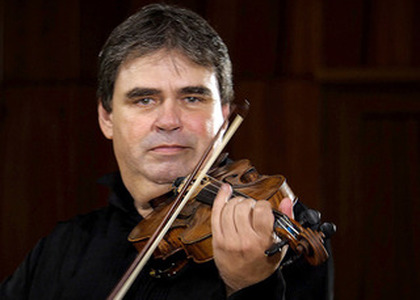> [Archived] Interviews

Interview with violinist Gabriel Croitoru
From the 8th to the 21st of November 2023, the "Enescu's Violin" tour will take place.
Mr. Gabriel Croitoru, this marks the second edition where your daughter, Simina Croitoru, accompanies you on the Enescu's Violin tour. In addition to your music, this time you're bringing two violins, intricately linked to George Enescu, to the rural areas. These are the Guarneri violin and the Paul Kaul instrument. What sets these twoapart?
Music enthusiasts are already acquainted with the distinctive qualities, so to speak, of the Guarneri violin, fondly nicknamed "The Cathedral" and famous for its profound resonance in the lower register. The other violin that Simina will play on this tour is one of the three violins crafted by Paul Kaul in the early 20th century for the maestro George Enescu. Speaking of their characteristics, I can say they were tailored specifically for master Enescu's hands, having unique measurements that make them exceptionally challenging to master.Setting aside their profound sound, these three instruments pose a formidable challenge to play, because the distances between notes are completely different from a regular violin.
The itinerary includes six rural locations across the country, and I understand that the schedule is highly dependent on the available space for the recitals.
That's right. Because in rural areas, based on our experiences from the previous years, we found it challenging to find an available piano, we designed this edition specifically for villages. Therefore, on stage, we will feature only the two violins. Of course, this program will differ from the usual one where pianist Horia Mihail will join us in the few concert halls on this edition's itinerary. In the repertoire prepared for the cities, we have Moritz Moszkowski's Suite, Carl Kämmerer's Ländler, a trio by Weber, Hubert Bauersachs' Liebeslied,Nicolas Louis' Fantaisie brillante. So, to be honest, we have some new pieces that I'm confident the audience will appreciate, just as much as the effort we've put into finding them. The repertoire for two violins and a piano is, in fact, quite limited, and to avoid repetition, we attempt each year to find a new composition, if not more. This year, except for Moszkowski's Suite, the entire program is fresh and exciting.
How has the tour been received in the previous years?
There have been instances where we enjoyed positive reviews from everyone, ranging from local officials to the general audience. Yet, there have been instances where the local organization, let's say, was less than desirable. Now, without hiding behind words, it always depends on those who make the rules in that area - the mayor, the teacher, the priest, and so on. They, indeed, brought a considerable audience to the concert in some places and confessed that they hadn't encountered our musical genre before. A good number of them suggested that we should return to give them another chance to experience this kind of music because, otherwise, it would be very challenging for them to attend a concert in a regular concert hall. I believe this is ultimately the purpose of this tour - to attract as many people as possible to the realm of quality music.
Would you like to invite our audience?
I would like to urge as many people as possible to be a part of these cultural gatherings because, in the end, staying informed about the cultural events around you is essential. You might end up liking it or not, but only by attending these events you can decide if you'd want to give the next one a shot. I had the opportunity at one point, a memory that brings a smile to my face, to talk with a priest from a rural area. Horia and I were there, and the priest said to us, "You are like Archangels Michael and Gabriel; please come again, we eagerly await your performances!" It struck me as a beautifully poetic connection.
Translated by Marian-Cătălin Niculăescu,
University of Bucharest, Faculty of Foreign Languages and Literatures, MTTLC, year I
Corrected by Silvia Petrescu














